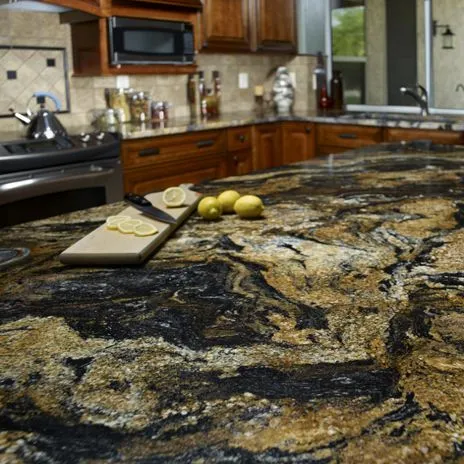Granite countertops are a popular choice for kitchens due to their durability, aesthetic appeal, and timeless nature. They have become a staple in modern and traditional kitchen designs alike, offering a combination of natural beauty and functionality. But what makes granite an excellent choice for kitchen surfaces, and how can it be properly maintained to ensure its longevity? Let’s dive into the details.
Materials Used in Granite Countertops
Granite is a natural stone formed from molten magma. Its composition mainly includes quartz, feldspar, and mica, which give it its distinctive speckled appearance and variety of colors. The stone is extracted from quarries in large blocks and then cut into slabs, polished, and customized for kitchen countertops.
High-quality granite is chosen based on its density, consistency, and aesthetic appeal. The variety of patterns and hues—from deep blacks and whites to greens, reds, and blues—ensures that every countertop is unique. The polished surface of granite not only highlights its natural beauty but also provides a durable and smooth finish that is resistant to heat, scratches, and stains when properly treated.
To install granite countertops, strong adhesive materials such as epoxy resin are used to secure the slabs in place. Sealants are then applied to the surface to protect it from moisture and stains, as granite is naturally porous.
Maintenance of Granite Countertops
Proper maintenance is essential to preserve the beauty and functionality of granite countertops. While granite is highly durable, it is not completely immune to damage. Regular care and a few preventive measures can ensure that your countertops remain pristine for years to come.
-
Cleaning Tips
Use a mild, pH-balanced cleaner or warm soapy water to clean granite countertops. Avoid using abrasive cleaners, acidic solutions (like vinegar or lemon), or harsh chemicals, as they can damage the sealant and dull the surface. Wipe up spills promptly, especially oil, wine, or acidic substances, to avoid potential staining. -
Avoiding Physical Damage
Although granite is scratch-resistant, cutting directly on its surface can cause minor scratches and dull the finish over time. Always use a cutting board when preparing food. Avoid placing hot pots and pans directly on the granite, as extreme heat can weaken the sealant or cause discoloration. Use trivets or heat-resistant pads to protect the surface. -
Regular Inspections
Periodically check for chips, cracks, or wear on the sealant. If any damage is found, repair it promptly to prevent further issues. Professional polishing can also restore the shine and smoothness of older countertops.
Conclusion
Granite countertops are a worthwhile investment for any kitchen, combining natural beauty with exceptional durability. By understanding the materials involved and following proper maintenance practices, you can ensure that your granite countertops remain a stunning centerpiece in your home for decades. With a little care and attention, this natural stone can withstand the test of time, adding value and elegance to your kitchen.



